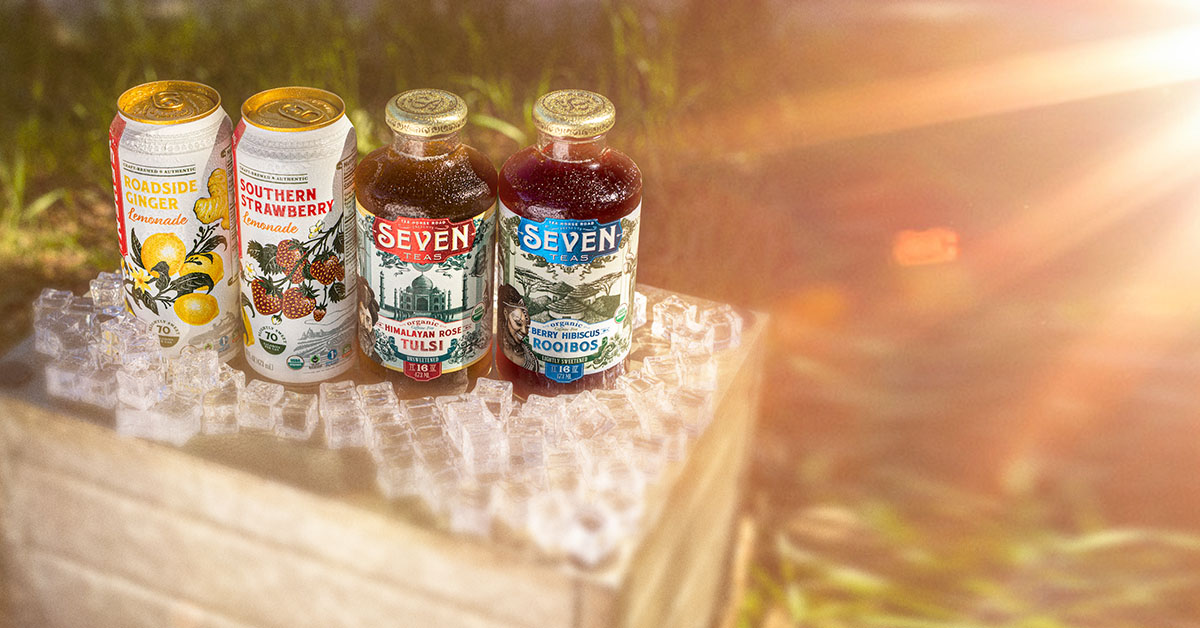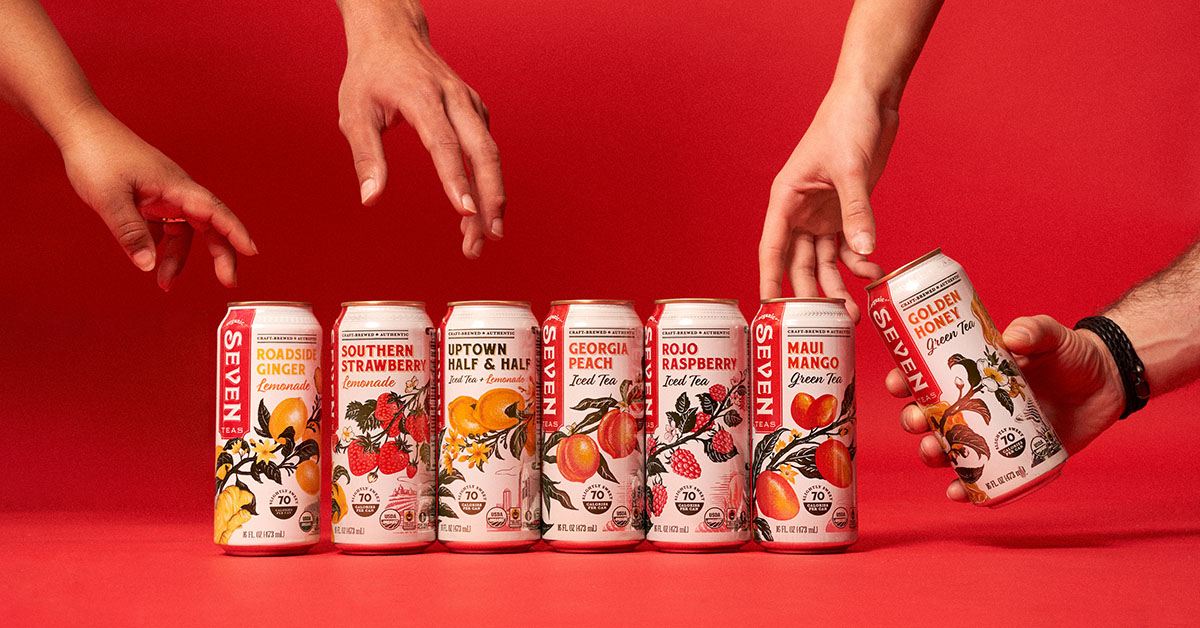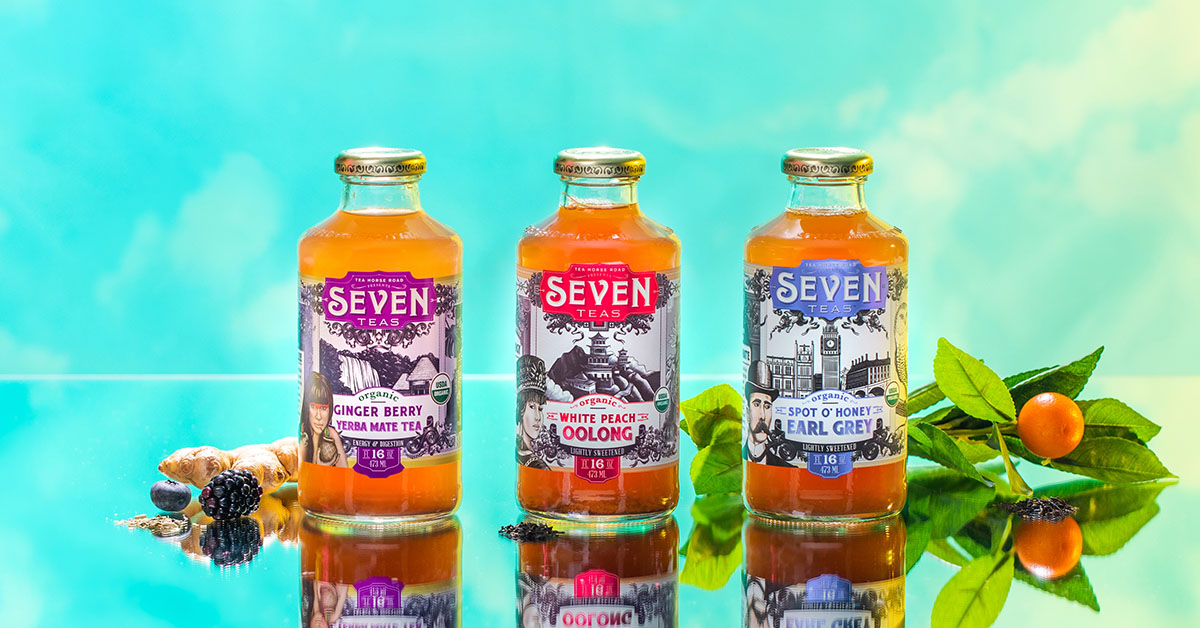
After slowly building a following in glass bottles since 2017, California-based Seven Teas is in acceleration mode, having landed new distribution partnerships and increased consumer interest in the last year as it expanded into canned teas and lemonades.
Brothers Josh and Jeremy Issakharian were inspired to create Seven Teas by their parents’ competing tea traditions: their mother favored iced Sweet Tea from the American South, while their Persian father’s preferred hot tea from Iran. The brothers have successfully melded those two disparate sides to create a portfolio of bottled and canned teas that pay tribute to both international and American traditions.
Back in 2017, glass bottles seemed like the obvious choice at the time as Seven Teas positioned itself alongside Honest, Tazo and other premium ready-to-drink teas in the natural channel.
Fast-forward to 2021, Seven Teas saw an opportunity to tap into American iced tea and lemonade traditions by adding a line of low-sugar, canned varieties meant to invoke a “road trip” across the U.S., Issakharian said. The line includes five iced tea flavors (Georgia Peach, Uptown Half & Half, Maui Mango, Rojo Raspberry and Golden Honey) and two lemonades (Southern Strawberry and Classic Roadside).

Since the cans launched at the beginning of 2022, the less expensive format has enabled the brand to grow 5X in dollar sales in the last year.
That’s not to say that Seven Teas has abandoned its glass roots. Currently, the brand offers its 8-SKU Traditional Teas in 16 oz. glass bottles and its 7-SKU 70 Calorie Classics in 16 oz. cans. The Traditional Teas are more exotic tea varieties like oolong, matcha or rooibos; whereas, the cans are based in “American Classics that everybody knows and loves.”
The glass bottles retail between $3.50 and $4 each while cans hover between $2.50 and $3.
“We have both the cans and the glass and they sit next to each other in the set,” Issakharian said. “They don’t cannibalize each other. They actually have a complementary effect. Our glass is our core, our cans are a little bit more of a crowd consumer and then we have our ‘crew consumer’ that likes both.”
The strategy appears to be working. When the company originally launched, it saw itself as an alternative to Honest Tea but since Coke’s discontinuation of the brand, Seven Teas has capitalized on the opportunity opening in the bottled and canned iced tea category where sales were up 7.1% year-over-year, according to Circana data in the 52-weeks ending June 18.
What started as seven flavors in glass in the SoPac and Rocky Mountain regions of Whole Foods Market has expanded with global distribution at all Whole Foods stores with the canned line, growing sales 146% in the last 12 months at the natural foods retailer, the brand reports.
As new ice tea brands have launched in both glass (Just Tea) and can (Weird Tea, Equitea) formats, Seven Teas has slowly filled in its distribution outside of the natural channel via an expanded DSD network.
This past year, the canned line has opened up a number of new regions and channels including retailers like Raley’s and all Publix locations along with Fresh Market and New Seasons Markets. The brand is gearing up for upcoming partnerships with Ralph’s and Weis as well as an exclusive launch of the new Wild Blueberry Lemonade flavor at Sprouts in September. All together, the brand is currently available in over 3,000 stores nationwide.

The brand recently on-boarded with national broker CA Fortune and “dialed up operations with a new East Coast co-packer” to both “nurture its existing partnerships” as well as fulfill “mainstream aspirations” to continue its march into the conventional grocery channel.
Though Seven Teas continues to be family-owned and employs a slim team of seven full-time employees (including the Issakharian brothers), the brand is “looking at options for fundraising and future growth” with institutional investors, Issakharian said; yet, there are no current plans to raise new capital.
“We are talking to certain individuals, financial vehicles, and really gaining more and more understanding on what’s going to work for us in the next leg of our business,” he said. “The priority for us is to make informed decisions that really align with our business’s overarching objectives.”
For now, those priorities seem to align with sticking with what’s working and not compromising the brand’s values to grow.
As Issakharian puts it, “to make tea more interesting, to make it a little bit cooler.”